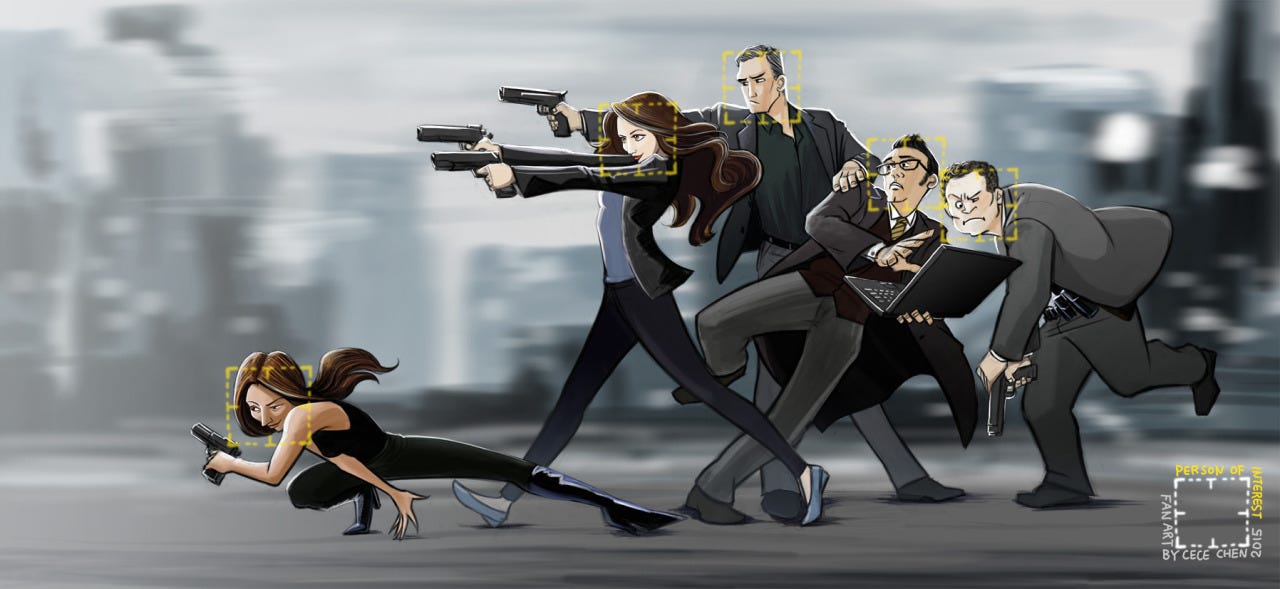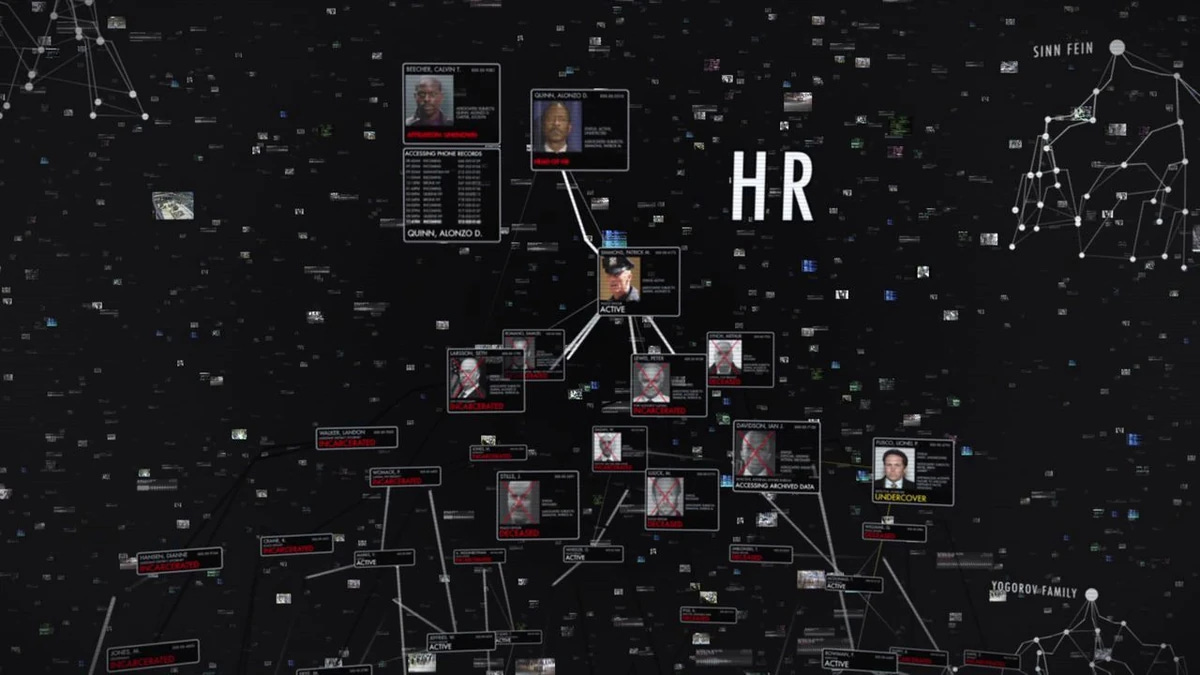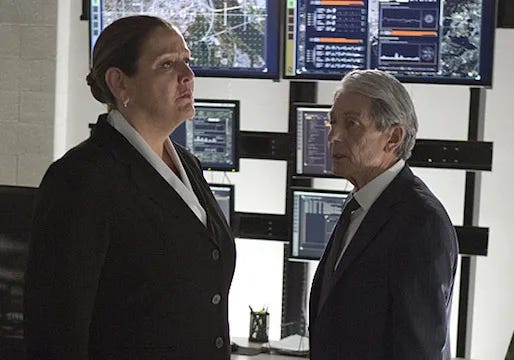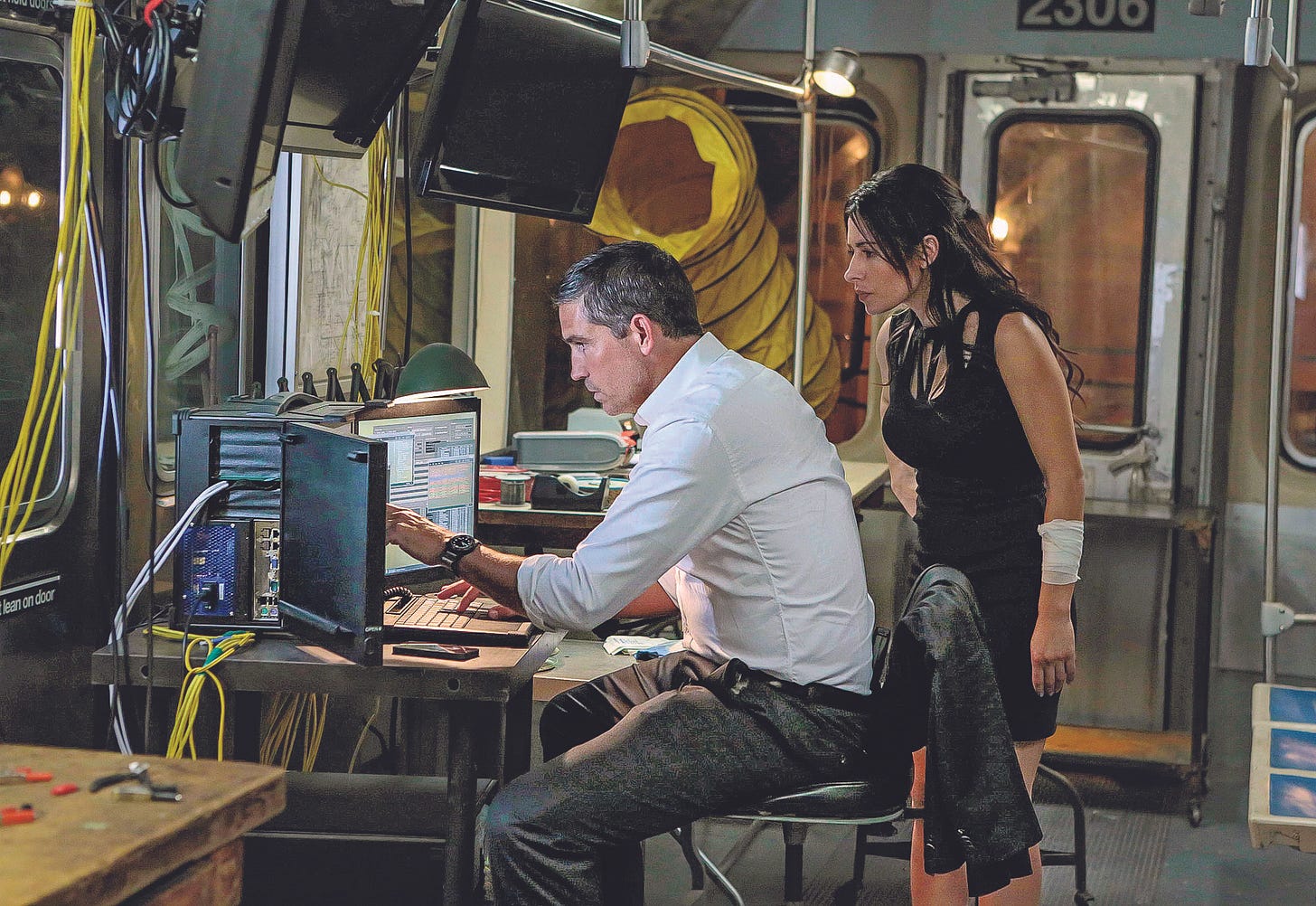Show Review: Person of Interest
This blog is for fiction and for AI. You knew this had to happen eventually.

As the five people who read this blog regularly know, I'm a huge LOST fan. It's a big part of my formative Internet experience, my first real "Internet fandom", as those started going mainstream in the early 2000s. I've reviewed its video game1, a fanfic,2 and wrote a mini-review for the show itself. But I overlooked something else of interest.
In 2010, LOST ended. Before that, the massive success of its first season had already pushed a bunch of, let's call light copycat shows into the forefront that would have probably never been greenlit otherwise. Flash Forward, Invasion,3 Jericho. Big concept shows, with ensemble casts, a big mystery at the middle and seasonal arcs that keep the audience interested.
The lazy nature of some of these, or maybe the writer's strike killed them off one by one. I watched some of them, mostly to stave off the cliffhanger-induced rage that LOST delivered weekly. But they all ended up disappointing in the end.
Perhaps that's why I ignored Person of Interest in 2011. I shouldn't have.
The Plot
You are being watched. The government has a secret system. A machine, that watches you every hour of every day. Billionaire Harold Finch4 knows because he built it. The government uses it to predict terror attacks before they happen, but consider violent crimes involving ordinary people irrelevant. Finch doesn't. Hiding from the authorities, he works with ex-CIA Action Man John Reese to prevent these "irrelevant" crimes.
Let's just come out and say it. This premise sounds like garbage. Minority Report was about how using an impersonal system to detect crimes and arrest people in advance was wrong. This show paints it as good, and even ignoring the moral implications, this just sounds like a dumb CSI-style procedural show.
It is, and it isn't.
The premise leaves out at least one important detail: Finch only has a backdoor for the machine, which sends him Social Security numbers of a person who is either the victim or the perpetrator of the predicted crime. Even the government has that limitation for its "Relevant" cases, and can't use the machine to directly spy on people. Finch did this on purpose: in order to keep a human in the loop, forcing an investigation; and to save the privacy of the billions of people being spied by the NSA feeds that power the machine.
Person of Interest is incredibly flawed in much the same way House M.D. is: the procedural stories aren't that bad, with a neat element of mystery, but marathoning both shows can become a bit of a torture because you start only seeing the patterns. Every episode is 42+ minutes, virtually all of which follow this formula:
Cold open with some funny character stuff, sometimes the best part of the episode. Cut to the intro with a pretty great monologue. I particularly love the delivery of secret system.
Finch gets a number, and starts investigating the person that matches it.
Reese starts doing recon on the target, often getting a job with an identity created with Finch's hacking skills. Usually it doesn't seem like they're in danger.
Next scene, the danger is revealed, often tech themed, so insert some action scenes here where Reese covertly saves them using his Action Man skillz, shooting people's legs because he doesn't want to kill anyone. Alternatively, Finch saves them using his Hacker Man skillz.
One or two scenes where the feds are slowly investigating Reese, who they think is just a killer-for-hire, either that or they have their own seasonal drama going on. Rarely, these scenes are replaced with flashbacks that flesh out the characters, especially early in the show.
Past the halfway point, it's revealed that the perpetrator/victim is actually the victim/culprit. Nearly every episode has a twist, it's usually either that or the case secretly being related to the seasonal plot.
It looks like Reese is about to die at gunpoint, but one of his allies saves him in the last moment.
Reese saves the victim, the victim thanks them, the culprit is usually shot in the legs and delivered to the cops.
Each season has its own gimmick that changes the formula a bit, but that would require me to pretty much spoil the plot, so I'm going to do just that.
SPOILERS AHEAD
While this isn't revealed until much later, let's start with the backstory.
The big historical point of divergence in the PoI history is Finch himself and his unique programming talent. As a young man, he hacks into ARPANET and breaks it for fun. He's charged with treason, which forces him to burn his old identity and become privacy obsessed.5 His father had also developed early onset Alzheimer's during his childhood, which made him want to create something that could take care of him when he was gone. He meets Arthur Claypool and Nathan Ingram at MIT under a new name, and he starts looking into artificial intelligence with them, with Nathan becoming his best friend and Arthur continuing Finch's early work in a different direction (which becomes relevant later).
Eventually, Nathan and Harold start a software company together, with Harold keeping a fake IT job and staying out of the limelight, but secretly doing most of the work, and Nathan being his "beard", the public developer for its products. After 9/11, they decide to develop a Machine for the United States, to help prevent terrorist attacks.
Finch, during the process of training the machine, is forced to terminate over 40 versions of it. At best, it starts imprinting on him and helping him (including setting him up with Grace, his main love interest), at worst it tries to kill him. Eventually he settles on deleting the machine's memory every 24 hours. Nathan has misgivings about the machine after seeing how ruthless the government is, so he codes a small backdoor that lets him access some data without Finch's knowledge. Finch then locks down the system so the government can only get the numbers of potential terrorists, and finally hands it over.
A few years pass. Finch suddenly discovers that Nathan has been using his backdoor, getting calls from public phones whenever the machine fetches irrelevant numbers, trying to save people on his own. Finch is against the backdoor, and that, compounded with the pressure of being unable to save everyone, makes Nathan decide to go to a journalist and blow the whistle on the government's program.
The NSA discovers this in advance, and stops a suicide terrorist attack with the machine in order to redirect him towards Nathan. The bomb kills him and cripples Finch, who at this point is still unknown by the US government. Realizing that the government is willing to do anything to keep the machine hidden, Finch uses the incident to fake his death, even keeping his fiancée Grace in the dark to protect her. He briefly considers revenge, but the machine convinces him to help people instead, and he takes over Nathan's backdoor. Over several months, he hires mercenaries to help him save people, but they keep dying or betraying him.

One of the people he saves is a government engineer that briefly uncovered an exploit in the machine, and Finch gets his hands on his laptop, coding a "patch" into the exploit so in case anyone uses it, it'll just help the machine defend itself against them, unlocking more capabilities. The laptop then leaves his hands, triggering the plot. The show begins here. Almost.
John Reese, a CIA operative who's forced himself to keep no personal attachments, is sent to retrieve the laptop from China, unaware of what it contains. He's betrayed by his handlers, with both John and his partner being secretly ordered to kill each other, all to prevent the laptop's exploit from being acquired by anyone else, and the entire area is bombed. John survives, and, disillusioned with his old job, becomes a New York bum, simply surviving day to day without a goal in life. NOW the plot begins.
Reese is attacked by some punks and defends himself, which gets him arrested by NYPD's Detective Carter. He escapes her jurisdiction, but as he keeps getting in trouble Carter keeps chasing him, thinking him to be a criminal, a plotline kept throughout most of the first season. He's almost killed by a corrupt cop, but John ends up "turning" him instead, or at least blackmails him into compliance, becoming a good source of police information. This corrupt cop is Detective Fusco, who has a pretty good redemption arc throughout all five seasons.
His abilities are noticed by Finch, who had been warned by the machine to save John, and he offers him a job. Unlike his previous employees, John is mostly a good person who just needs to be aimed in the right direction, so there's a strong synergy there.
Day to day, Finch and John (who are known by fans as Team Machine, as more people join them) get new numbers and try to save them together. John handles the action scenes, Finch handles "chair guy" tasks and sometimes helps with in-person recon. John avoids Carter and uses Fusco as a source. And that's the basic "story loop" for the first season.
In one episode, a mysterious hacker known as Root is foiled by Team Machine, and she gains an interest in them, kidnapping Finch at the end of the season in order to get access to the machine, who she sees as a chained but benevolent god. This drives the initial plotline of Season 2.
Oh yeah, Reese also rescues a dutch attack dog, Bear, who becomes the best character in the entire show in addition to a team mascot.
Mid-season, a new character named Shaw, who basically has Reese's old job and used to handle the government's "relevant numbers", leaves her team after the NSA kills her partner for looking into the source of their data too hard (the machine). She ends up making her way to Team Machine, though she is kind of a sociopath with no emotions.6

At the end of S2, the laptop finally comes into play, and the machine uses its new autonomy to choose Root to directly communicate with (in addition to its old "send numbers to Finch and the US" behavior), which seems nonsensical but makes more sense as the plot evolves.7
I'll summarize a bit harder here: the first three seasons or so, a few storylines keep cropping up, like the CIA or the government trying to arrest or kill Reese, or a network of corrupt cops (which they call HR) causing trouble, or mob-related arcs (these arcs mainly involve a don by the name of Elias).8 These plotlines often seem to go away only to return with a vengeance seasons later, which can get annoying. The network of corrupt cops in particular overstayed its welcome a lot. This is not that relevant to the main plot, but I assume it appealed to the more action-oriented part of the fanbase.
In Season 3, the HR arc comes to an end, with Carter finally building a case and getting the leader arrested, but it gets her killed.9 In the second half of the season, the Main Villain team, Decima Technologies, run by Greer, a former MI6 agent who wants to usher in a One World Government, uncovers Arthur Claypool's work on artificial intelligence (remember? I told him he'd be relevant) and manages to make a rival AI, Samaritan, which makes up for worse code with newer, more distributed hardware.
Root manages to hijack a few servers to cover Team Machine's identities from Samaritan, but it’s a complete victory for Greer otherwise. The alternative would have been killing a Senator to prevent Greer from having access to government feeds, and Finch refused to compromise his morals, so the government abandons the machine and switches to Fascist AI Services Inc.
In Season 4, the gameplay loop STILL consists of saving more irrelevant numbers, but the team now has cover identities to avoid capture: Reese is a NYPD Detective with Fusco as his partner,10, Finch is a professor, Shaw has a shitty retail job, and Root gets a perpetually shifting identity to do jobs around the country. At the end of the season, the Machine is defeated by Samaritan, knocked out from the power grid where it had been hiding, and forced into a smaller, local system in the protagonists' base.
The final season is shorter, with the show having barely survived cancellation. This means a slightly rushed conclusion, with some recurring characters like Leon and Zoe11 never getting an "ending", but it's good enough for me. Harold is forced to compromise his morals and keep expanding the machine's powers to fight back against the evil AI. Shaw is finally rescued, and Finch releases a virus that kills both Samaritan and the Machine, at the cost of Root and Reese being killed as the virus is uploaded to a satellite12, but at least government surveillance and Greer are both stopped. Harold reunites with Grace, Fusco continues being a good cop. At the very end, we see Shaw and Bear receive a call from the machine, with the show essentially starting over.13
As you can see, 103 episodes have a LOT of plot,14 even when you omit the procedural storylines (did you know we have a whole privacy-oriented terrorist group called Vigilance I didn't mention once? They don't really matter)15 and skip over some details as I did. As is tradition, let's split this into things I enjoyed and things I didn't, starting with the bad, because I overall feel positively about the show and would like to leave on a good note.
The Bad
Attrition of Interest
Yeah, the filler, I'm going RIGHT there. I've touched on the topic throughout the entire plot summary, but PoI is over a hundred episodes, so the fact that many of them have a samey structure just grinds down your enjoyment. I watched every single episode of S1 and S2 in full, but by S3 my enjoyment of the new "irrelevant number" plotlines had vanished, and I found myself skipping through some of the scenes once I got the gist.
This is a big problem. In other shows, you can just find episode lists online and just kind of pick and choose what you want to prioritize, but PoI is particularly good or bad at this, because virtually every episode does end up advancing the main plot or at least revealing something about the main characters. Nothing is really skippable on an episode level.
Beyond this, the showrunners seem to also keep up a repetitive structure for the first four seasons. Usually, the first two or three episodes are excellent, after that we're onto the main loop of numbers, then it builds up with two good episodes in the middle of the season for a "mid-season finale"16, back to numbers, maybe with a different focus (switch from cops to mob, from mob to cops, something like that), and finally you have four or five episodes that ramp up to a really good finale.
In season five, I appreciate there are only like two filler episodes and the rest stays on track, but that's only 10% of the show.
I make it sound bad, but the fanbase loved this at the time. It's much easier to enjoy a show like this when you're watching it weekly instead of binging it. You can discuss the latest reveals with friends, theorize about the future, and you get a small weekly story about saving people as a plus. Obviously, it sucks that any new fans will have to bear with this, and shows like LOST or The Sopranos handled it much better by refusing to have procedural aspects. But it'd be a much different show without them. Who knows if it was the right choice?
Marketing
The show's pilot is terrible. Jim Caviezel, who plays Reese, sounds like kind of a scumbag from all stories I've heard about him. The plot sounds far more boring than it is. It makes sense, then, that the show has fewer new fans talking about it than even LOST.
You're not going to join a thriving fandom by catching up, and it's going to be an uphill battle to recommend it to anyone.
Plot Armor and Action Tropes
Yeah, one main character dies throughout the show, and then a couple others die in the final arc. But beyond that, everyone gets off scot free no matter the situation, it gets incredibly, incredibly annoying. They use *all* the tricks to keep you from caring about stakes:
Every time characters get shot, they secretly had a vest on. They don't have a policy of always wearing a vest, though.
Every time they look like they're going to be shot in the face, a team member is teleported in (not literally, the sci-fi elements are contained to GPT-7 level AI stuff) to save them.If you don't see a headshot onscreen, the character survived, 100% of the time.
The characters survive explosions, unconsciousness like nobody's business, back to normal by next episode or even the next scene. I did appreciate a brief storyline with Reese recovering from a big shooting and having to wear crutches, but that happens once in over a hundred episodes.
No one hides their identity or face when it makes sense, at least not commonly. I guess this is because the audience cares about seeing faces, but John always wearing the same suit for crime and cop stuff and never being recognized is some Superman bullshit.
This applies to the villains too. The annoying chessmaster Greer, in particular, calmly walks away while being shot at at least thrice, and Elias returns from total defeat multiple times.
The Good
Acting
While the episodic ones are just kind of alright, the show seems to randomly land on perfect combos of actor and character, from the HR lieutenant Simmons, who has a perfect screen presence and personality for his role, to Elias, who switches from playing a mild-mannered teacher type to ruthless mobster based on the situation. Even the leader of Vigilance, whose actor was essentially an ascended extra, steals the show every time he shows up. Must be something about the actor direction of the showrunners, because they really hit gold too many times to be luck.17
Ironically, some of the main characters like Jim Caviezel's John Reese or Amy Acker's Root tend to feel more ridiculous and flimsy than the supporting cast, though thankfully it's not show ruining.
Oh yeah and Michael Emerson fucking rules, but you already knew that.
The Characters and their Arcs
Person of Interest excels at this. A benefit of the drawn-out plot is that you can put a lot of little character moments in every episode. Finch, Fusco, John, Shaw, Carter also change and improve believably over the show. Fusco goes from a corrupt cop to a heroic defender of justice so gradually you don't notice.
Maybe the only nick in the armor for this schema is Root's arc, where she goes from essentially being a psychopathic, god complexed killer-for-hire to a manic pixie dream girl over the span of five episodes, but they do end up going some good places with her relationship with the Machine, so I guess I'll give that a pass.
Beyond their development, the characters play off very well off each other, with Fusco providing some good down to earth comic relief that reminds me of characters like Star Trek's Chief O'brien, Finch and Reese having a bickering nerd/chad (that secretly like each other) dynamic, and Carter and the team clashing over morality/lawful issues. Basically every scene that consists of the main characters talking in a room knocks it out of the park, so that keeps you going through the filler.
The Presentation
It would have been really easy to half-ass the visual elements of the show into a CGI mess, but the show keeps a consistent, somewhat understated visual identity throughout. You can easily tell Samaritan's "personality" just by seeing its UI compared to the machine, for example. The show's intro sequences are tied into that, and as I think I've already said, Michael Emerson's delivery of the monologue combined with the often changing visuals make me stay and watch them far more than I usually would. Same with the scene transitions, which make even stock footage look interesting.
The action and fight scenes are also pretty well shot,18, though the show loves having car crashes with big vans spinning in the air (see the “Crash scene” video above). Even the lower budget fifth season had those, they really weren't willing to compromise.
The "Sci-fi" Elements
Person of Interest is extremely forward looking to the point its most sci-fi elements (which the show got lightly criticized over) have aged like fine wine. Finch's attitudes over Artificial Super Intelligences (ASIs), his arguments with people telling him to just accelerate, are arguments I'm seeing live on Twitter in 2024, with Finch accidentally becoming a stand-in for Eliezer Yudkowsky at times.
The most absurd capabilities of the machine turned out to be the ones we're getting first from products like ChatGPT. Perhaps all we've got left to being able to build a Machine is raising context (the amount of information an AI is able to process at once) and reducing latency, because otherwise, the capabilities are there. In fact, they had to nerf GPT-4 before release because it was too good at recognizing people, something that carries the conceit of Person of Interest. To a lesser degree, this predicted government programs like PRISM before it happened.
Unlike other shows of this caliber, where the conversations raised are extremely outdated or trite, like "should we respect people that are different from us????", “do we have free will or is it all predestined????”, Finch is terrified of unleashing a non-human superintelligence on the world until the very end, no matter how benevolent it is. This is an argument still being fought today, as I mentioned earlier.19
Of course, it's not perfect. The hacking elements of the plot tend to use all the right words, almost like they had a single tech advisor looking at the news and forcing them to use terms like Stuxnet, or bluejacking, but always overstate their effectiveness. Some of it can be justified with Finch's influence, but it's still flimsy. Beyond that, in the latter seasons the evil AI's brainwashing/VR capabilities go over the top to the point of comedy, with Shaw being unable to tell what's reality and what isn't after enough cycles of VR.20
The Conclusion
So, is the show worth watching? I'm sorry to tell you that I don't know. I really did speed through quite a bit of seasons 3 and 4, so that should mean they sucked, right? Not really, they had a lot of good stuff.
The show has great ideas, great scenes, great characters and interactions, and the overall machine plot is one of the best mainstream AI representations in the market. But it's also saturated with procedural filler that the industry has largely moved on from. That said, it never made me want to drop the show. I knew I'd never stop slowly getting plot progression, if held hostage by procedural plots. It never lost my trust.
I think I'd recommend it with a few caveats:
You’re swimming in free time.
You are willing to micromanage your experience and skip ahead when needed.21
You care about Artificial Intelligence and the philosophy around it.
If this doesn't apply to you, give it a pass. You can watch four great sci-fi shows in the time it takes to watch this one. I for one have been eyeing From, another mystery show with a LOST actor as a lead... hmmm...22
This show is impossible to google in 2023, the unholy combination of popular name and zero cultural footprint.
Michael Emerson, whom you may know as Benjamin Linus from LOST
In fact, we don't know his real name by the end of the show. A man after my own heart.
This is kind of a running theme in PoI, but at least she's willing to play by the team's rules and do things non-letally.
Essentially, the main driving philosophy of the machine is that everyone can be redeemed and deserves saving, so it's attracted to fixing evil people with potential to do good, like Root eventually shows.
Who steals scenes every time he shows up, so they kept him alive for a LONG time after John first saves his life. He's the type of mobster that keeps things running smoothly instead of constantly causing gang wars, so Team Machine reluctantly collaborates to maintain that status quo, sometimes asking him questions on the criminal element. He also looks like this.
Apparently many fans didn't like Carter, presumably for her sometimes hypocritical Lawful Good attitude, but I thought she provided a good balance to the show, and it's sad the actress decided to leave and they had to kill the character off.
The fans defend this decision as "well no one will think to look for him there!" but it really makes no fucking sense. Really, the new identities are an entertaining gimmick for a few funny scenes, but were largely a waste of time plotwise.
Which were pretty good characters but ultimately irrelevant. You can see Leon in the Bear clip above if you really want to.
You may think this is stupid, but the virus itself was only introduced two episodes in advance, instead of at any point during the two Samaritan seasons, that’s stupider.
People say this is opening the door to a Season 6 and they're fucking insane. It's clearly just a "the adventure goes on" style ending, Shaw and Finch don't really have a show-carrying chemistry even if Finch wanted to watch the numbers again.
I have to wonder if a single non-watcher even made it here, let alone understand what I wrote.
A much more common model when shows got 22-24 episodes per season instead of the new pathetic streaming model.
One exception is the actress for Control, who technically plays a good character, but once you realize the actress is constantly moving like a bobblehead while talking, you can't unsee it.
Though I did notice they started being half-assed in S4 and S5. I believe they stopped caring about realism very much when Reese’s actor starting making stunts unsafe, but I also think he was the only one who really tried. A note: Root dual wields pistols and Shaw immediately decries that as super lame, which is true to life. Sadly, Root doesn't give a shit and adopts it as her trademark.
I strongly disagree with Finch. I’d prefer to use AI to avoid the extinction we know, even if it means risking an extinction we don't understand. However, Finch never seemed to be strawmanning the opposition. He raised all the valid points that could be raised.
An arc that basically writes her out of the plot for a year because the actress had twins, so I guess they had a good excuse.
They call it "Godmode" when the machine gives you path-to-victory style orders and it looks like you can see the future. I call my +10 seconds and +30 seconds Plex skips "Zoomermode".
It's at this point you may remember I was supposed to be writing a different review. Yeah, I continue to slowly, slowly make my way through that because its braininess unironically makes me want to enjoy and review other things faster. It's like shrapnel productivity. In fact, I had no plans to make a big PoI review while watching it, but I just suddenly felt the need upon finishing, and now I'm typing this after a few sessions over a single day. Let's do this again sometime.









